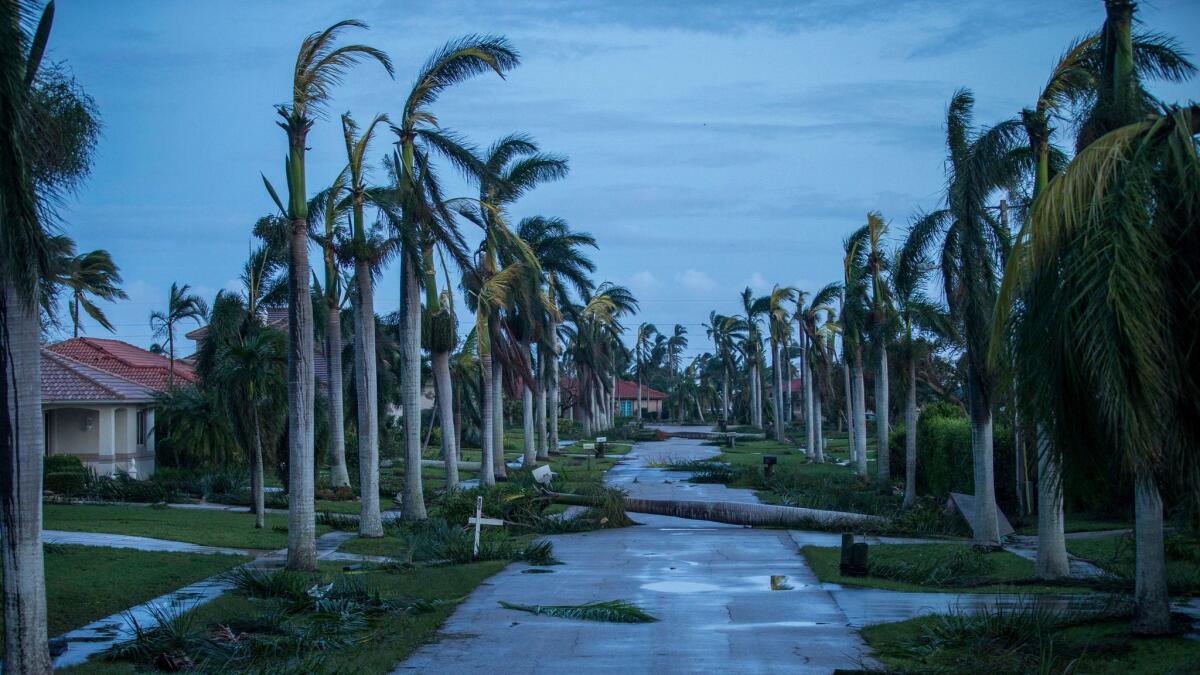Opinion: Harvey and Irma say this is the right time to discuss global warming

- Share via
As Hurricane Irma was bearing down on Florida on Friday, Scott Pruitt, who runs the federal Environmental Protection Agency, told a television interviewer that the moment was inappropriate for discussing climate change because, well, there were other things to discuss.
“Here’s the issue,” Pruitt said. “To have any kind of focus on the cause and effect of the storm, versus helping people, or actually facing the effect of the storm, is misplaced.”
That is patently absurd. And it’s the same dismissive canard we hear after high-profile shooting incidents. Sorry, too soon, respect the victims, we shouldn’t discuss gun control now. With the hurricanes in Florida and Texas — and who knows where else by the end of the season — the argument now veers to, sorry, we need to focus on helping people recover, can’t discuss that vital policy issue now.
Well, yes, you can, and should. Arguing otherwise comes perilously close to saying the federal government and political system are incapable of walking and chewing gum at the same time.
Well, maybe they have something there.
With both Harvey and Irma, the government finds itself crafting responses to foreseeable circumstances, which is necessary. But failing to make the proactive analysis and develop policies to anticipate and mitigate the impacts is the failure here. And as one of the Trump administration’s main climate-change skeptics, Pruitt should be pressed on the issue, and his atrocious efforts to undo regulations aimed at reducing fossil-fuel emissions, while the issue is staring us in the face.
No, global warming did not cause these hurricanes. But climate experts say with deep credibility that global warming makes such storms bigger, stronger and quicker to intensify. Warmer ocean water feeds more powerful hurricanes. And as the atmosphere warms, it holds more evaporated water, making rainfall heavier even from more common storm systems than hurricanes.
This is not an either/or discussion. They are intertwined issues, with inhabitability of the Earth hanging in the balance.
Did climate change make Harvey and Irma worse? That line can’t be fully connected, but those storms fit what the climate scientists say to expect. Which makes this the perfect time to have these discussions. Want more such storms? Well, that’s the likely outcome of generations of burning fossil fuels. But Pruitt doesn’t want to discuss that.
“What we need to focus on is access to clean water, addressing these areas of Superfund activities that may cause an attack on water, these issues of access to fuel,” he said. “Those are things so important to citizens of Florida right now, and to discuss the cause and effect of these storms, there’s the … place [and time] to do that. It’s not now.”
Well, yes, attend to the nation’s stockpile of Superfund sites by cleaning them up long term, and in the short term, build sufficient infrastructure to protect them from leaks whether or not they are hit by a hurricane. Definitely focus on access to clean water for those who have lost it to hurricane damage, but also take steps to reduce global carbon emissions, which in turn can reduce salt-water intrusion into coastal aquifers. While we’re on water, stop messing with the Clean Water Act in general. Rolling back the Waters of the United States regulations imperils access to clean water rather than increasing it.
And access to fuel? Lovely idea, though not the way Pruitt means it. The nation does need the gulf refineries to reopen safely to serve short- and near-future needs. But if the government adopted policies that would reduce our over-reliance on carbon-based fuel supplies, the impact of future shutdowns wouldn’t be so sharp. And reducing auto emissions by, over time, converting the national fleet to electric vehicles would also help limit global warming.
This is not an either/or discussion. They are intertwined issues, with inhabitability of the Earth hanging in the balance.
See? That wasn’t so tough. We can, and must, work to reduce the scope and impact of future natural disasters while helping those who are affected by the current ones.
Follow Scott Martelle Twitter @smartelle.
UPDATES:
3:41 p.m.: This blog post by Scott Martelle initially was published, erroneously, as an editorial by The Times Editorial Board.
More to Read
A cure for the common opinion
Get thought-provoking perspectives with our weekly newsletter.
You may occasionally receive promotional content from the Los Angeles Times.







